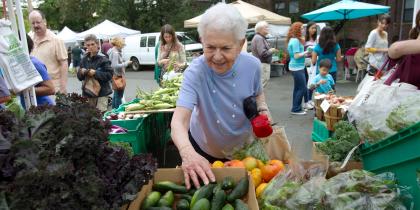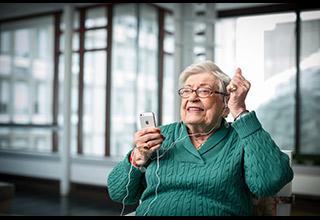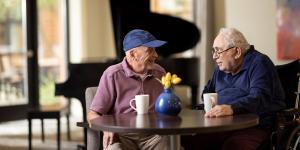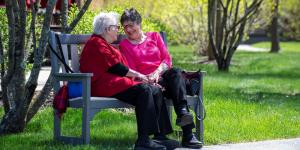How to Prevent Malnutrition in Older Adults
Know the signs to look out for and how to help an older adult avoid poor nutrition.

As we age, it can be more difficult to ensure our bodies are getting the proper nutrients. If we don’t, that can lead to malnutrition, which is defined as the lack of proper nutrients for someone to function. Malnutrition can result from a combination of many different factors, including an imbalance of protein, calories, vitamins, and minerals.
As director of nutrition for Hebrew Rehabilitation Center in Boston and Hebrew Rehabilitation Center at NewBridge on the Charles in Dedham, MA, my job is to ensure the patients and residents we care for have proper nutrition every day. In this environment, we can closely monitor patients to make sure they’re getting what they need and adjust their personalized nutrition plan as necessary.
Older adults living independently in the community can face more challenges in getting proper nutrition. According to the National Council on Aging, more than 10 million older Americans are at risk of or experience hunger. There are some signs and symptoms of not getting the proper nutrients that have serious consequences.
Causes of malnutrition in seniors
Although malnutrition can affect any population, older adults are at a higher risk for many reasons. They may experience decreased appetite, weight loss, decreased mobility, and limited access to healthy food, among other challenges. Older adults may face challenges that affect nutritional intake, including slower nutrient absorption, difficulty swallowing, changes in taste, or medical conditions such as dementia.
It can also become increasingly difficult to shop or cook during older adulthood, especially if chronic health conditions or mobility limitations are present. That can cause a person to lack the nutrients and fresh foods that are so important to staying healthy.
Another cause of malnutrition in seniors that can’t be overlooked is poverty. According to Feeding America, 6.9 million seniors aged 60 and older — or 8.7% of the older adult population — were food insecure in 2022, meaning they lacked adequate access to food. Too many older people on a fixed income are forced to make difficult choices between paying for food, rent, heat, medical costs, and other basic expenses.
Potential health complications
Not getting enough vitamins, nutrients, and supplements can have lasting effects on your body, especially in older adults. Several health complications can potentially be related to malnutrition, and some are more serious than others. Potential complications include:
- Increased mortality
- Immune suppression that makes it harder to fight infection or recover from surgery or illness
- Muscle wasting that affects the ability to conduct activities of daily living
- Increased risk of falls
- Longer hospital stays, complications, and readmissions after discharge
- Higher health care costs
Tips to help prevent malnutrition
What can you do to prevent malnutrition in yourself or someone in your life? The most important thing is to be observant. If you notice that your loved one is losing weight, gaining weight, seems weak, or has wounds that are slow to heal, speak up. Ask your loved one about their daily eating habits, and take a peek in the kitchen to see what kinds of foods are in stock.
Here are some ideas to help stimulate your or your loved one’s appetite and to maximize nutritional intake:
- Consider easily-prepared, nutrient-dense, high-protein foods with a longer shelf life, such as peanut butter, canned meats, eggs, yogurts, cheese, milk, nuts, and seeds.
- Consider frozen or canned fruits and vegetables for the longest shelf life.
- Many stores offer pre-cooked meals or entrees. This saves you energy for eating.
- When your appetite is poor, it is best to maximize each bite! Add extra toppings such as peanut butter and jam on toast or butter and brown sugar on a sweet potato. Add gravies, sauces, or butter to potatoes and vegetables.
- Have high-calorie protein snacks at night: Ice cream or yogurt frappes, instant breakfasts, Greek yogurt, puddings, nuts and seeds, peanut butter, or cheese and crackers with milk.
- Stimulate the senses and appetite by setting a table with a placemat and flowers. Listen to music or watch television with meals. You could even set up FaceTime or Zoom to eat with extended family.
When should you start to be concerned?
Many older adults live alone, and children or a friend may notice signs that something may not be right. If you’re not able to visit in person, just talking with your loved one may help you realize something could be wrong.
Malnutrition can become serious quickly. Contact a doctor immediately if you notice any of the following:
- Sudden loss of appetite
- Eating less than 75% of a meal for more than a week
- Episodes of nausea, vomiting, or diarrhea for more than three days
- Unexplained weight loss of more than 10 pounds
- A decrease in activity level
Doctors and dietitians can screen for malnutrition and food insecurity to identify if there’s a problem.
Screening for malnutrition
The Malnutrition Screening Tool, which Hebrew Rehabilitation Center dietitians use, can help identify people who have or are at risk of malnutrition. This initial screen helps to identify patients at nutritional risk who need more consultation with a dietitian.
The Malnutrition Screening Tool asks two simple questions to identify if your loved one is at risk for malnutrition.
Have you recently lost weight without really trying?
If yes, how much weight have you lost?
| Response | Points |
| 2-13 pounds | 1 |
| 14-23 pounds | 2 |
| 24-33 pound | 3 |
| 34 or more pounds | 4 |
| Unsure | 2 |
Have you been eating poorly because of a decreased appetite?
| Response | Points |
| No | 0 |
| Yes | 1 |
Add the weight loss and appetite points to determine your MST score. An MST score of 2 or more indicates your loved one is at risk, and it is time to intervene with nutritional support.
Health care providers also screen for food insecurity, because lacking reliable access to food can increase the risk of malnutrition. A quick way to assess if your loved one lacks access to enough food is to utilize the Hunger Vital Sign, a series of questions and steps that allows dietitians and health care providers to assess how severe the situation is:
- In the past 12 months, have you been worried that the food would run out?
- In the past 12 months, have you bought food that didn’t last?
If the answer is true or sometimes true to EITHER STATEMENT, your loved one is food insecure.
Step 1: If food-insecure, assess for co-existing risk factors for poor nutrition.
- Poor food access (limited ability to travel to stores)
- Frailty or cognitive decline
- Dental problems
- Social isolation
- Lack of appetite
- Limited ability to complete the physical activities of preparing food or feeding oneself
- Lack of cooking or storage equipment
Step 2: Track your weight over time. If you’re unable to, you can monitor the fit of your clothes.
Step 3: Refer to resources.
There are many resources for you or your loved one if they’re struggling with malnutrition or food insecurity.
- Food pantries offer free food or grocery items for people of all ages.
- Home-delivered meals support adults 60 and older through programs like Springwell, Ethos, Meals on Wheels, and the Executive Office of Aging & Independence Senior Nutrition Program.
- Medically tailored meals (e.g., Community Servings) can meet the needs of those with specific health conditions such as diabetes and kidney disease.
- Enroll in all eligible household benefits, such as Medicaid, utilities/transportation assistance, and SNAP benefits (formerly called food stamps).
- Patient assistance programs that provide medication support can help older adults avoid having to choose between food and medications.
- Grocery and meal delivery services can be ordered online or by phone through many grocery stores.
- Regional elder care agencies in Massachusetts, known as Aging Service Access Providers, can help you coordinate care and understand which services you or your loved one are eligible for.
Outpatient medical nutrition therapy at Hebrew Rehabilitation Center
If you or a loved one has concerns about malnutrition, we are here to help! Our outpatient medical nutrition therapy program for older adults was developed by registered dietitians to manage and treat various health concerns, including malnutrition. To learn more, contact us online or call our outpatient nutrition therapy program at 617-363-8539 in Boston or 781-234-9630 in Dedham.
Lizzie Russo also contributed to this blog post.
Blog Topics
Learn More
Hebrew Rehabilitation Center
Hebrew Rehabilitation Center provides skilled care and support after illness or surgery and offers long-term chronic care and specialized care for those with memory loss.

Long-Term Chronic Care
Hebrew Rehabilitation Center provides person-centered extended medical care in a homelike setting for patients with chronic illness. As a licensed long-term chronic care hospital, we provide higher-level, more comprehensive medical care to older adults than a traditional nursing home.

Outpatient Nutrition Therapy
As part of our specialty outpatient care, we offer one-on-one nutrition counseling at Hebrew Rehabilitation Center in Boston. Our Registered Dietitians, who specialize in the needs of older adults, will help you stay in overall good health or provide suggestions to manage or prevent specific health concerns.



